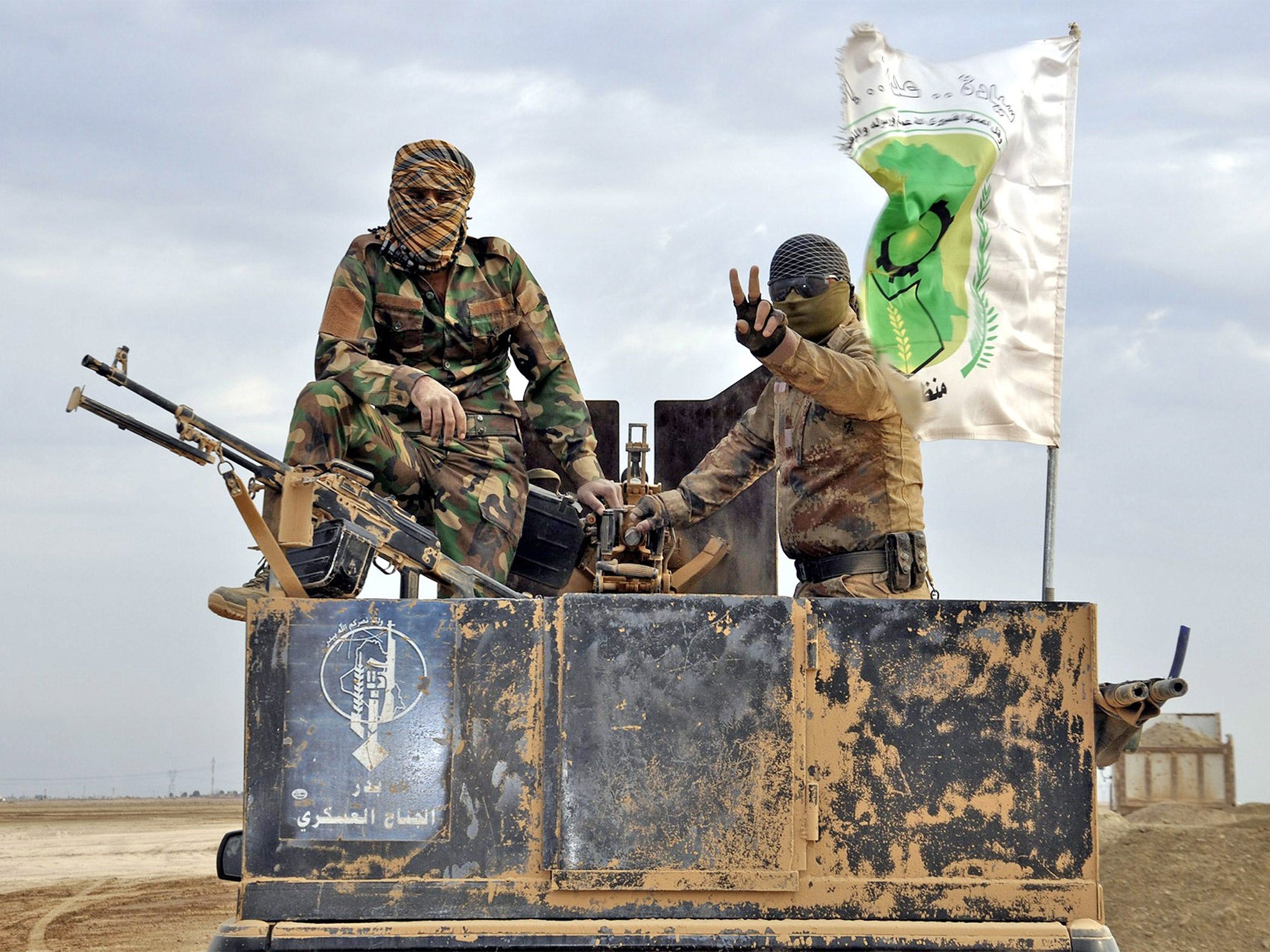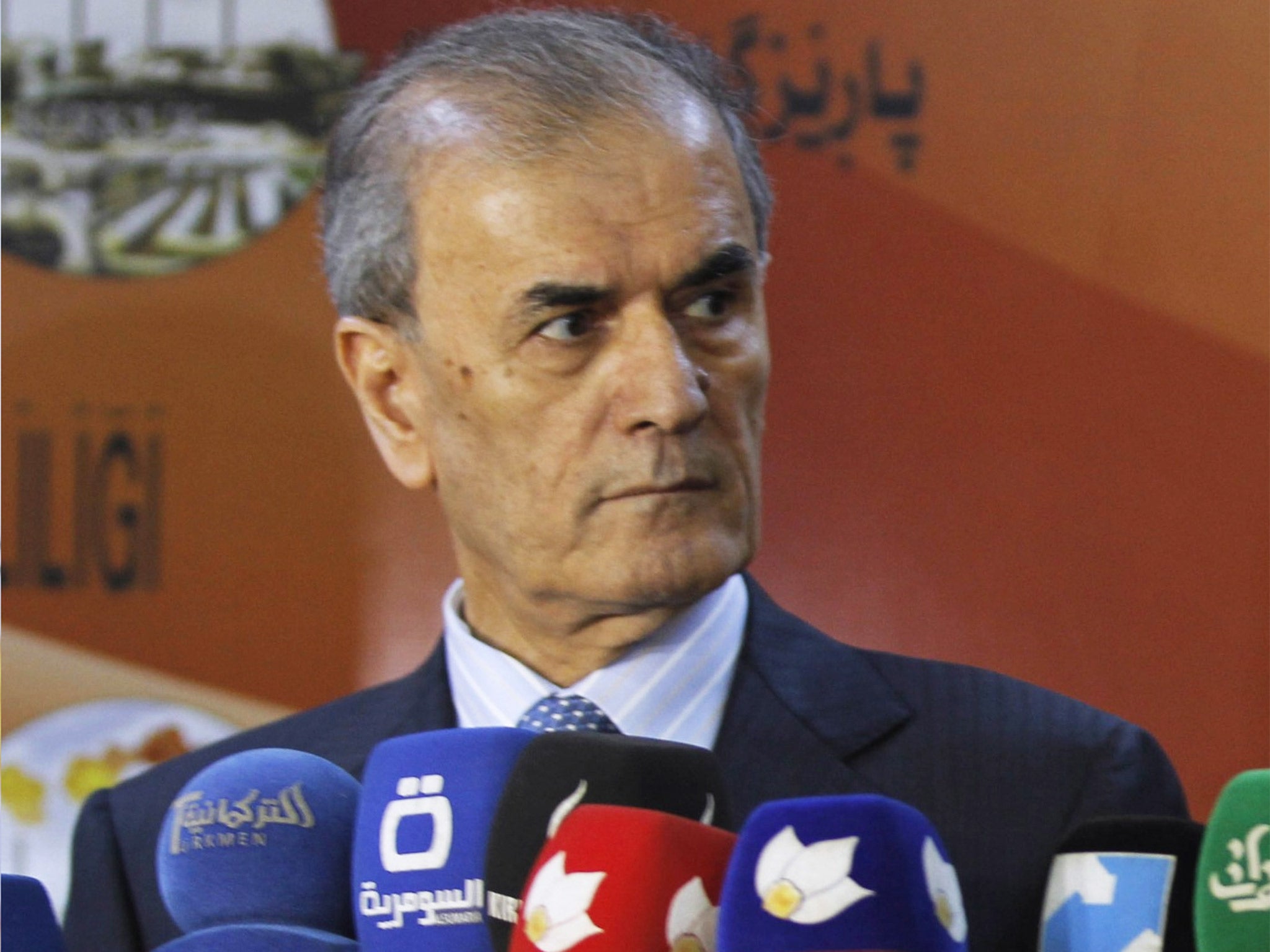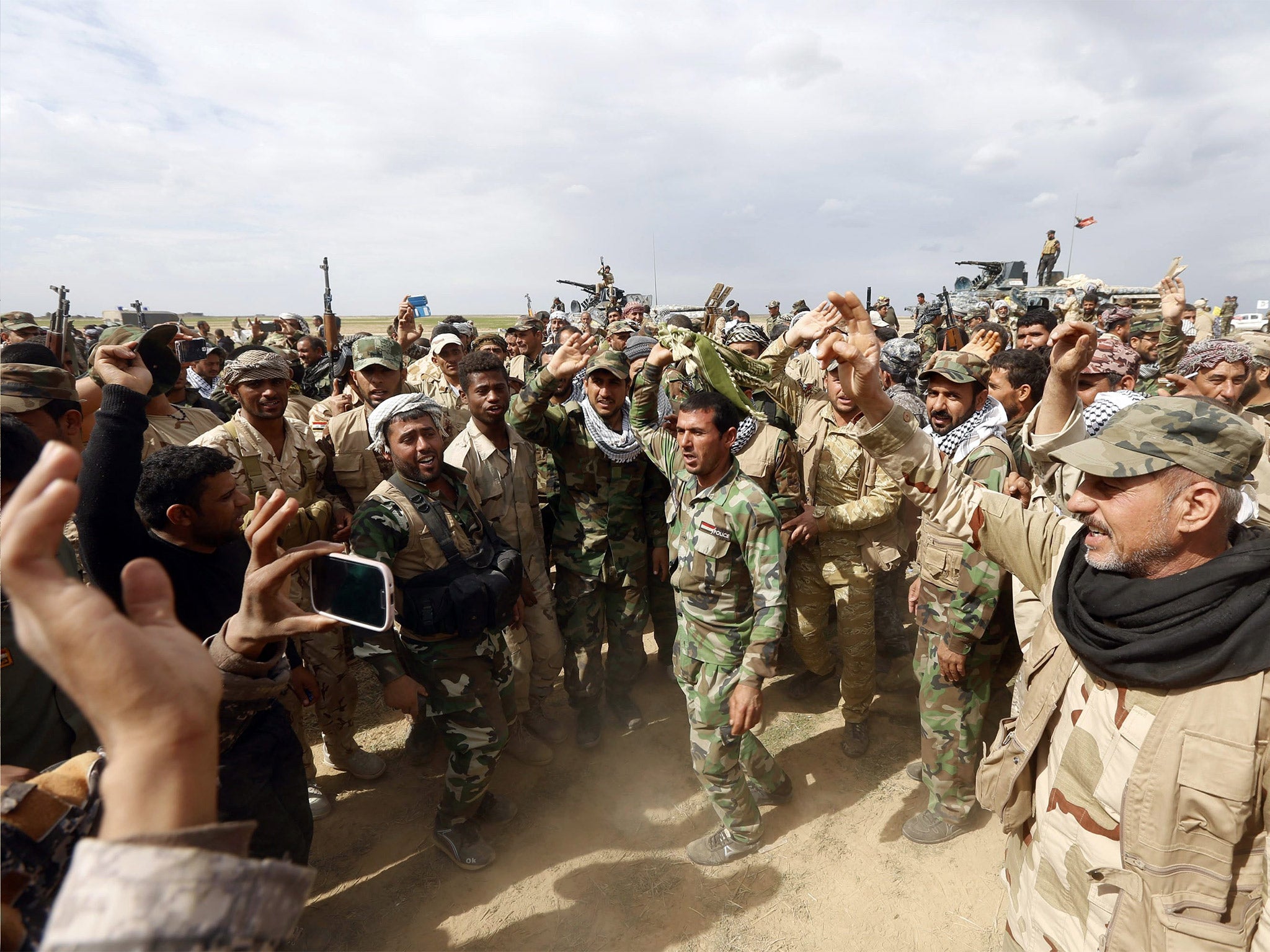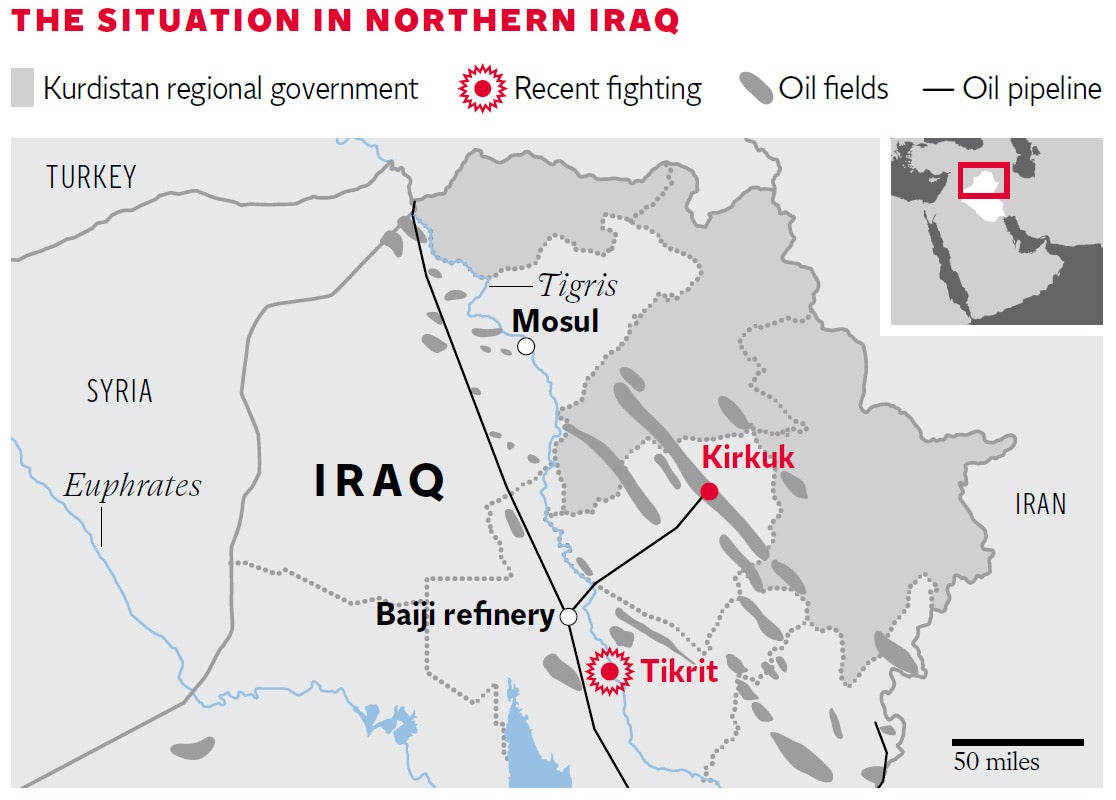War with Isis: Iraq's government fights to win back Tikrit from militants - but then what?
The Iraqi army's offensive to push back the jihadists is making headway, but depends heavily on it's Shia allies in the volunteer militias. Patrick Cockburn reports from Kirkuk on a conflict which sectarianism has made intractable

Your support helps us to tell the story
From reproductive rights to climate change to Big Tech, The Independent is on the ground when the story is developing. Whether it's investigating the financials of Elon Musk's pro-Trump PAC or producing our latest documentary, 'The A Word', which shines a light on the American women fighting for reproductive rights, we know how important it is to parse out the facts from the messaging.
At such a critical moment in US history, we need reporters on the ground. Your donation allows us to keep sending journalists to speak to both sides of the story.
The Independent is trusted by Americans across the entire political spectrum. And unlike many other quality news outlets, we choose not to lock Americans out of our reporting and analysis with paywalls. We believe quality journalism should be available to everyone, paid for by those who can afford it.
Your support makes all the difference.Some 60 miles from his office in the capital of Iraq’s oil-rich province of Kirkuk, a battle is raging for control of Tikrit. It might seem a hopeful sign that Baghdad is finally attempting to win back a key city from the control of Isis, the jihadist group that swept into a great swathe of Iraq last year. But Kirkuk’s governor, Najmaldin Karim, is not optimistic about the long-term outcome.
It is not the military but the political consequences of the fighting that worry him. “What are you going to do after you liberate these areas... are the people who fled from there going to be able to go back?” In other words, is the war in Iraq now so pervasively sectarian that Sunnis can no longer accept rule by a Shia Muslim-dominated central government?
Before the self-proclaimed Islamic State (also known as Isis) captured Tikrit on 11 June last year, the city had a population of about 260,000, almost all of them Sunni. The offensive to drive out Isis that is now under way is very much a Shia affair with 30,000 soldiers, half from the regular army and half Shia militias. Significantly, it is taking place with the support of Iran and without the backing of US air strikes. Iran and the US may have a common enemy in Isis, but in Iraq they are fighting two very different wars.
Dr Karim says there is no alternative for the Baghdad government but to rely on the Shia militiamen. “The army is pretty well incapable of taking on major operations, while the militias are better equipped and probably have better fighters,” he told The Independent in an interview at his Kirkuk office.
Dr Karim’s career is a blend of professional success and Kurdish nationalist commitment. Born 65 years ago in Kirkuk, he trained as a doctor then became a Peshmerga, or fighter, in 1973, a couple of years before a Kurdish rebellion against Baghdad collapsed after the US and Iran cynically withdrew support.
After that defeat, Dr Karim accompanied the exiled Kurdish leader, Mulla Mustafa, to Washington, and remained there for 30 years as both a highly regarded neurosurgeon and a lobbyist for the Kurdish cause. He recalls giving evidence to the Senate Foreign Relations Committee in June 1990 about Saddam Hussein’s genocide against Kurds. But the administration of the day, six weeks before the Iraqi invasion of Kuwait, asserted that Saddam was “a force for moderation”.

When I last saw Dr Karim two years ago, he was realistically sceptical and even contemptuous of the capacity of Baghdad to fight the growing threat from Isis and other jihadist groups. But he was also confident and enthusiastic about his achievement in developing Kirkuk city and the surrounding province.
These days, he looks worn down and is gloomy about the future. Kirkuk may be safe from Isis attack, but it is filled with signs of calamity. In the past year some 350,000 displaced people, almost all Sunni Arabs running for their lives, have swamped the city which previously had a population of 950,000.
And the money has run out. The violence has been accompanied by a collapse in the price of oil – which Kirkuk is now unable to export. Before Isis swept in, Kirkuk used to send 150,000 barrels a day of crude to the Baiji refinery north of Tikrit; but that complex has been at the centre of a battle for months. Now, in the heart of the great Kirkuk oilfields, shops are reduced to selling plastic containers filled with black market petrol.
“It has been terrible,” said Dr Karim. “It is not just a matter of expelling Daesh [the Arabic acronym for Isis] from Tikrit and Mosul. We are not receiving any funding from Baghdad – nothing for reconstruction or the IDPs (internally displaced persons) using our schools, water and electricity.”

Iraq’s central government is so detached from Kurdish-controlled Kirkuk that Baghdad officials in charge of these services no longer visit the city. Asked if Kirkuk could be described as running on “empty”, Dr Karim replied simply: “And on flat tyres.”
Is there any solution to the convulsive violence in a country as divided as Iraq is, both by ethnicity and by religion? Dr Karim says that the replacement of Nouri al-Maliki as Prime Minister – notorious for his confrontational policies towards Sunnis and Kurds – with Haider al-Abadi last year had made only a superficial difference. “Abadi may have more support internationally, but on Shia-Sunni issues and Kurdish-Baghdad issues nothing much has changed,” he said.
In his view, the only solution is to divide Iraq into regions, with geographic power sharing, granting separate Sunni and Shia regions the same autonomy already enjoyed by the Kurds. It seems a long shot, but Dr Karim is conscious that no single Iraqi community has the strength in the long term to dominate the others by force. “You must resolve things politically,” he said. “You can’t resolve them militarily by just killing people.”
He is scornful of US-backed plans to raise yet more security forces, such as a new National Guard, that would be more inclusive of Sunni Arabs “Soon we are going to have 1.5 million people under arms which will impose a tremendous strain on the economy,” he said.

Since the breakdown in Baghdad’s control, Iraq is already effectively divided into regions which not only behave like independent statelets, but like independent statelets at war. Iraq’s Sunnis – a fifth of its population – have no leadership other than Isis, which Dr Karim says has absorbed Saddam’s old Baathist leaders.
Sunni members of the Baghdad government have no popular support, he says. They are the same old faces playing musical chairs as they vie for jobs. “Among the Sunni, there is a sense that whoever cooperates with the government in Baghdad automatically ceases to represent them,” he said.
As for Isis, he sees it as strong, not necessarily in numbers but in the faith of its fighters, as well as in their training. Isis leaders successfully conscript recruits where they are in control: their fighters who died after killing two senior Peshmerga officers in recent fighting near Kirkuk appeared to be locally recruited Iraqis. “When you look at the corpses of their dead you can see they are very young – in their late teens or early twenties,” he said. “They suffer huge losses, but they don’t seem to care.”
No single Iraqi community has ever succeeded in permanently forcing its rule on the other two. Saddam failed against the Kurds before he was ousted in 2003 and the Shia have failed against the Sunni since then.
Dr Karim’s vision of Iraq divided into regions may be inevitable, but those regions may well be at war with each other, not at peace.
Join our commenting forum
Join thought-provoking conversations, follow other Independent readers and see their replies
Comments